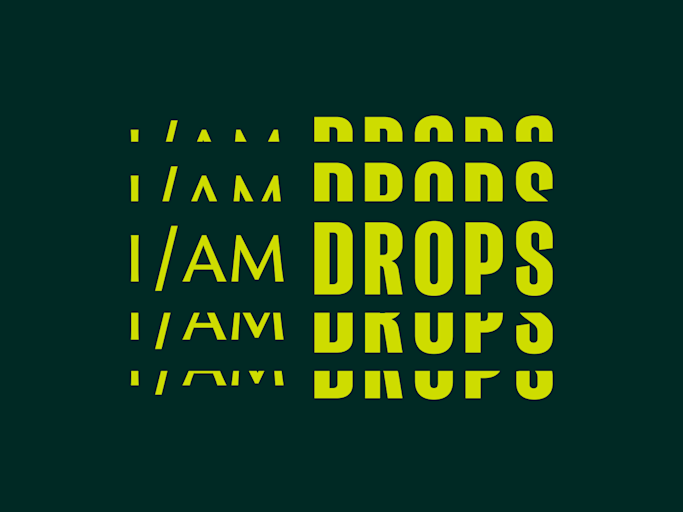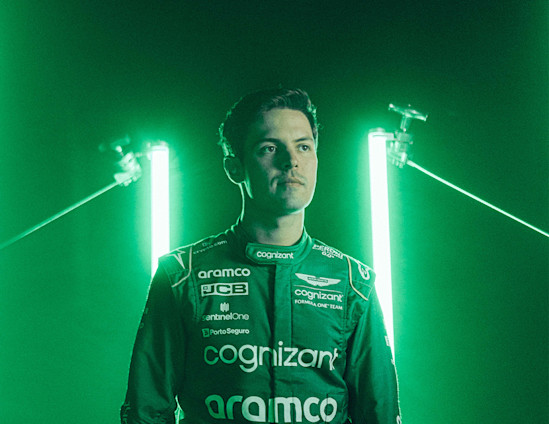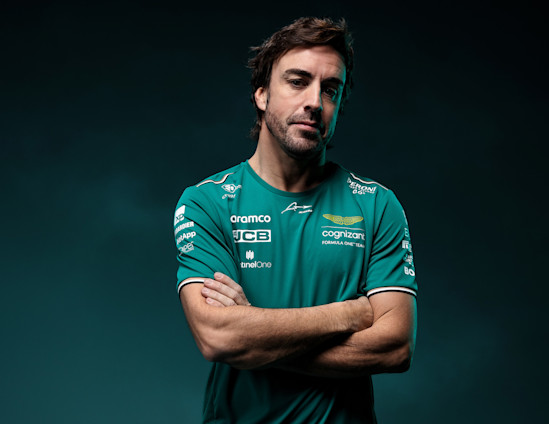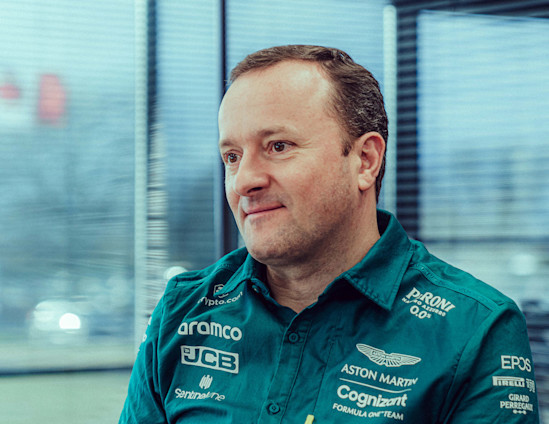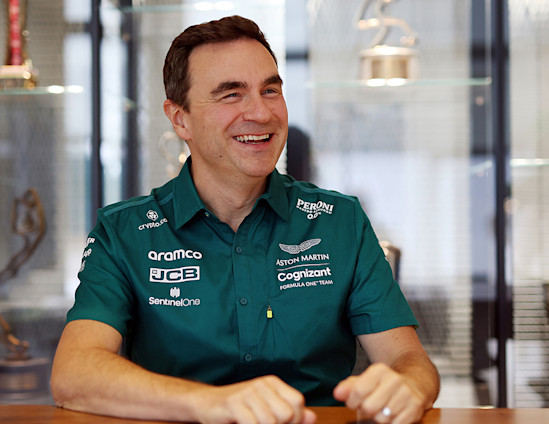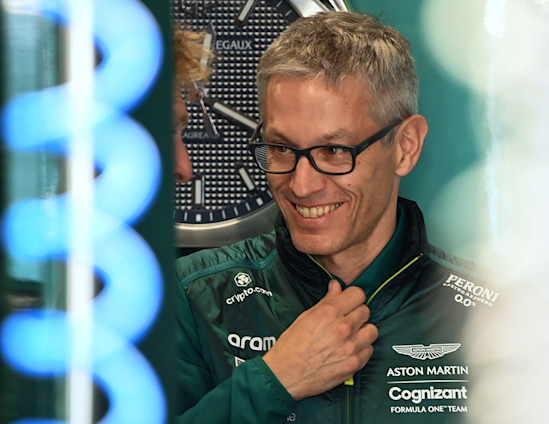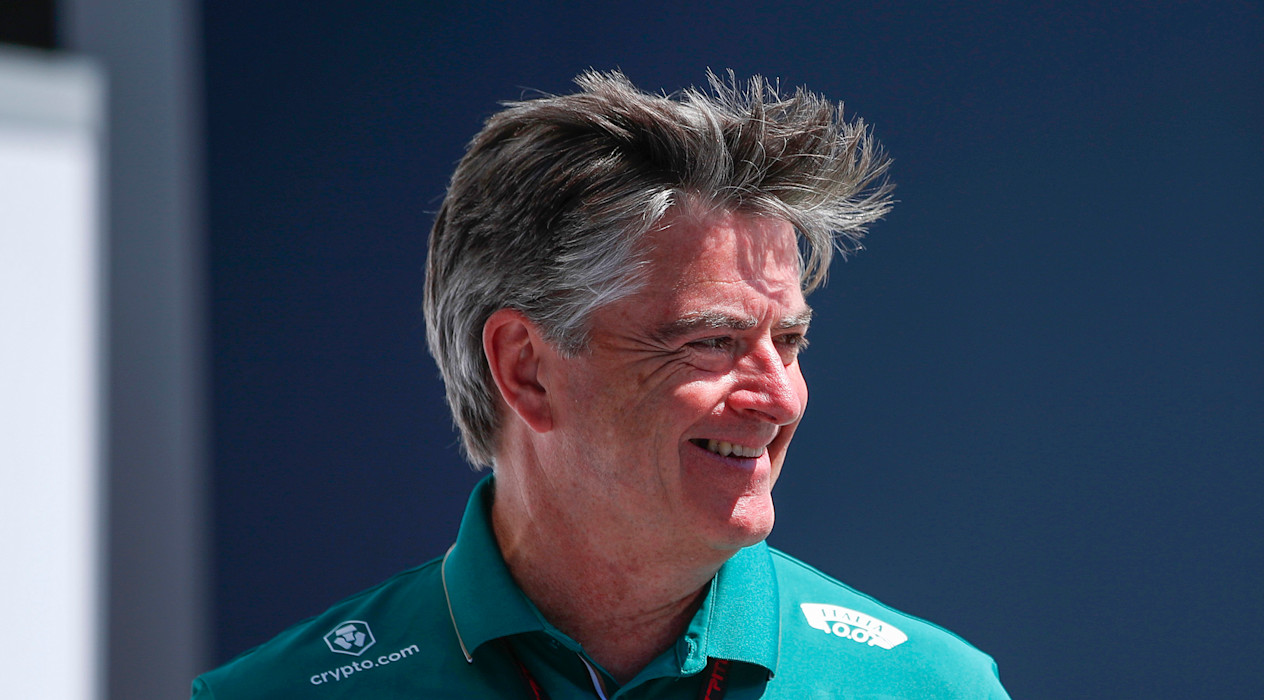
Aston Martin Aramco Cognizant Formula One® Team Sporting Director Andy Stevenson on the transformation of the team, proving Eddie Jordan wrong, and unfinished business.
"You have to keep up, you have to be ready. You have to understand every single word."
Andy Stevenson is staring intently at the copy of the 2023 Formula One Sporting Regulations on his desk – the only item on his desk other than his computer, we might add.
"The regulations are updated every year as the sport evolves and you have to keep up so that when a decision goes against you or you spot a mistake made by a competitor, you're ready to react," he says.
Typically found on the AMF1 Team pit wall at Grands Prix, a rare lull in the F1 calendar caused by the absence of the Chinese Grand Prix has allowed us to catch up with the man tasked with leading AMF1 Team's garage operations and the team's interactions with the sport's governing body, the FIA.
Having been with the team since its inception more than 30 years ago, rising through the ranks to Chief Mechanic before becoming Sporting Director in 2005, the bond between Andy and Team Silverstone runs deep.
Few know the sport and our team better than Andy and in a far-reaching interview, the latest in our candid interview series, UNDERCUT, he reflects on the team's transformation, why the FIA has a thankless task, whether the new F1 Sprint format will work, and more.
'You won't last long here,' were the words Eddie Jordan told you when you joined the team. How did you deal with that?
I was much, much younger in those days and, although I couldn't see it then, looking back now it was clear what Eddie was doing.
Eddie was trying to motivate me. It wasn't that he didn't want me in the team. What he wanted was to get me doing double the amount of work that he was paying me for – and that's exactly what he got.
When he said that, I thought, 'I'll prove you wrong: I'll keep my head down, work hard and still be here.' It didn't feel like hard work, though. It was easy because I was enjoying what I was doing.
You don't feel the stresses and strains when you get satisfaction from everything that you're doing in your job. That's what has kept me going each year and why I've stayed here for so long. Every year you look forward and think about how things can improve and how you can contribute to that improvement. Before you know it, you've been doing it for 35 years!
What about when things don't go the way you expect or want, for example when Fernando was hit with a 10-second time penalty shortly after the Saudi Arabian Grand Prix, which would have cost the team a podium? That must have been stressful and far from enjoyable.
When things are stressful, that's when I thrive. Those moments are challenging but they're right in my wheelhouse. That's when I can draw on all my knowledge and experience. You can call on past experiences and precedents that have been set.
Every off-season, I watch replays of races – endlessly. It drives my wife crazy, but I do it to remind myself of what's happened and the precedents that have been set so I can be prepared for the challenging moments we'll inevitably face in the season ahead. And, obviously, I do a lot of preparation with the Sporting Regulations – you have to know them inside out.
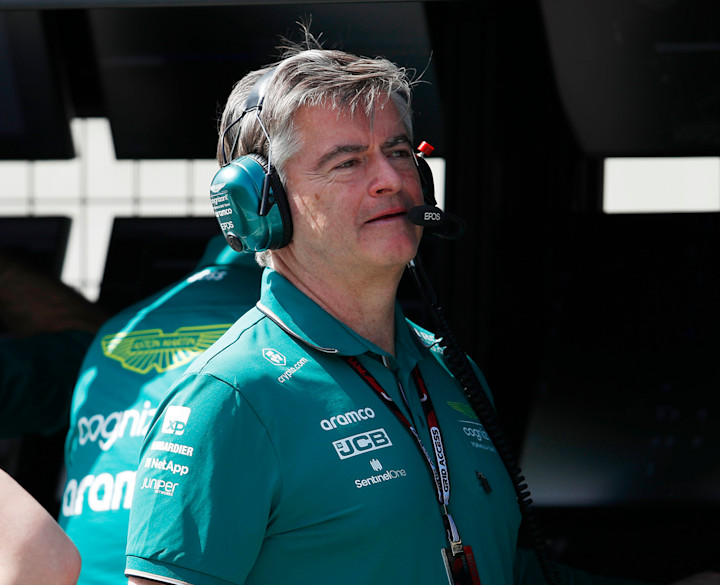
"You need to have every shred of information that will support your case ready to present to the FIA. You can never appeal a decision on a whim. If you start crying wolf, the FIA will never listen to you."
How do you know when to appeal a decision made by the FIA?
You've got to pick your fights. You can't always be in the ear of the FIA. Sometimes decisions won't go in your favour, but you've got to roll with it.
When it's fairly clear-cut or something that you're going to gain from, that's when you go in to fight your corner.
You need to have every shred of information that will support your case ready to present to the FIA. You can never appeal a decision on a whim. If you start crying wolf, the FIA will never listen to you.
I always feel that we, as a team, go in very well prepared and at the right times – and I think we've seen the fruits of that this season with the way some of the final decisions have played out, such as us regaining Fernando's podium in Jeddah.
When the red flag was thrown three laps before the end of the Australian Grand Prix, were you lobbying the FIA not to restart the race because it put a strong result for the team at risk, with Fernando third and Lance sixth, or did you view a restart as an opportunity?
We saw the second red flag and standing start in Australia as an opportunity.
We had the same thing with Sebastian Vettel a couple of years ago at the Azerbaijan Grand Prix. Some team members wanted the race stopped and not restarted but Seb was saying, ‘No, we've got to get this race restarted.' He saw it as an opportunity and, in the end, we went from third to second.
In Australia, we could see that both Fernando and Lance wanted a restart and you think to yourself, 'OK, we could be on for an even better result here.' Obviously, it didn't quite work out that way, at least not immediately after the restart, but it was certainly exciting.
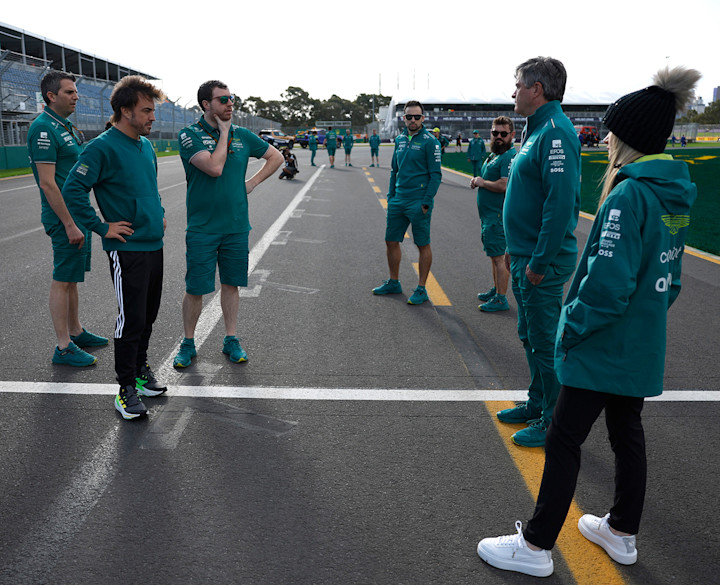
"There was a bit of uncertainty in Australia, but the FIA got it right. They are the only ones with all the information and people need to remember that."
There was a lot of confusion surrounding the two red flags and restart procedures at the end of the Australian Grand Prix. Did the FIA get it right?
The Australian Grand Prix ended the only way it could have. It's clearly written in the regulations. We had a conversation with Race Control before it all happened, to let them know what our understanding of the rules was, and they informed us of the decision they were going to make and that their interpretation of the rules was the same.
There was a bit of uncertainty, but the FIA got it right. They've learned from things that have happened over the last few years, and they managed the Australian Grand Prix extremely well. They are the only ones with all the information and people need to remember that.
None of the people who were disagreeing with the red flag in Australia had all information about the condition of the safety barriers, what was happening around the circuit, and where the safety vehicles and doctors were. No one did, except the FIA. We have to trust the FIA because they have all the information.
Do you ever feel sympathy for the FIA?
The FIA can never win. When the race goes well it's because everyone else was great and when it goes wrong it's because the FIA got it wrong. I feel for them, but it goes with the territory – they take on that responsibility and they handle it very well.
The upcoming Azerbaijan Grand Prix is set to feature the first F1 Sprint of the season and a new format has been mooted. Is it going to work?
We're very close to finalising the format. We've been working closely with the FIA and going through it carefully with our engineers and strategists to make sure it's workable. We all support the new format, but we need to make sure that the regulations are going to work as intended.
What I like about the proposed new format is that the two parts of the event, the Sprint and the Grand Prix, are separate. Drivers will push harder and take more risks in the Sprint because their finishing position won't affect their grid position on Sunday.
It's going to be an extremely exciting weekend. Baku is an interesting selection for a Sprint race. It could be very challenging for the teams and drivers, especially because of the high attrition rate that we get in Baku due to the unforgiving nature of the circuit.
Has the four-week gap between the Australian and Azerbaijan Grands Prix been a welcome respite or a frustrating pause, and is the F1 calendar too long?
We're a race team so we should be going racing. That's what we're here to do – that's what we love. When you look at the size of F1 teams now, they should be able to contest 24 or 25 Grands Prix every year.
We wouldn't want to see the calendar grow much more because then you risk diluting the product, but it's fantastic that the sport is so popular. There were times when this wasn't always the case. We would go to Grands Prix and some would be pretty quiet. It's not like that anymore and it's fantastic to see.
Is the season made easier by having a competitive car?
It is certainly more enjoyable going to Grands Prix when you've got a competitive car, but it is more challenging. We've been racing for a long time, and we've been working hard to get to this point, preparing for the moment when we have a car that we can really compete with.
When you've got a competitive car, it does make the race weekend even more intense. You come home on Monday morning and you are exhausted – really exhausted.
A team at the back of the grid will say it's working as hard as the teams at the front, and there's a lot of truth in that, but the mental strain is much greater when you're at the front. There's a lot more that you have to think of. You're constantly risk-assessing: you want to make sure that you get absolutely everything right.
Has the competitiveness of the AMR23 changed the way the team goes racing?
The processes are very similar. We have to extract the maximum performance from the car and the team in every session.
When you're at the back of the grid, you're trying to pick up your points when others make mistakes. You're always ensuring you do the job properly, but the level of competitiveness is different – it's heightened – and you have to stay incredibly focused.
In the past, we've done very well with cars that weren't so competitive, and we've always taken pride in that. When others have tripped up, we've always been there, ready to capitalise, thanks to our preparation, organisation and processes. Now, we can't trip up because there are teams who will look to take advantage of our mistakes.
Everyone is looking at you. Any mistake, even the tiniest error or a hint of a mistake, and everybody is pointing it out. When you're towards the back of the field people aren't watching you as much, but when you're at the front you're constantly under the microscope.
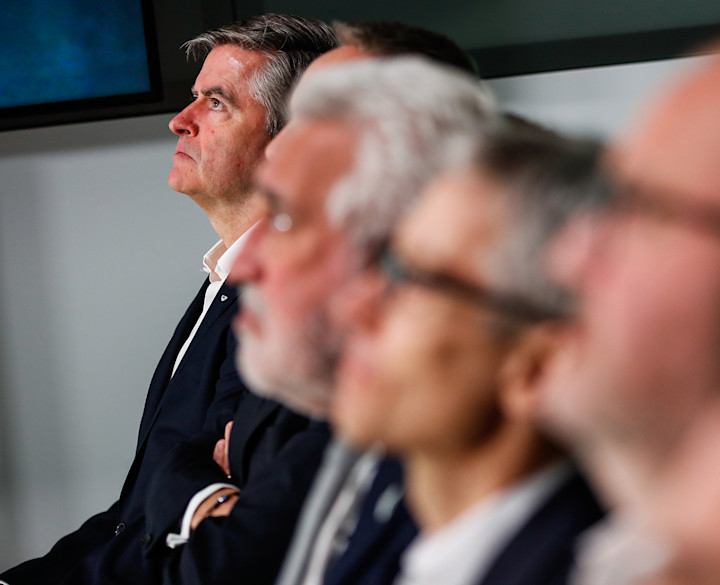
"What Lawrence Stroll has allowed us to build here through his support and vision is amazing. It's such an opportunity. We're all privileged to be here – to be part of this journey."
Does it feel like what you're doing matters more – when the team is fighting at the front and all eyes are on you?
It does. We're part of an amazing team here, part of an iconic brand, and that alone is enough to make you feel proud. But when the car is competitive and you're fighting at the front, everyone walks that little bit taller. You can see it in everyone in the team – everyone's grown that little bit.
Can the team maintain this level of performance?
We have to remain realistic. It's going to take a lot of hard work to stay where we are. There are some incredibly well-established teams that might not have started the season strongly but will be doing everything they can to close the gap and try to beat us.
We came into this season confident in the work we had done with the AMR23 – but not overconfident – and we delivered the car that we thought we could. In the same vein, we're confident in our development plan for the season. We know what we're doing and the direction we're going, but we don't know what the others are doing – that's the unknown.
Do you feel under pressure?
In terms of maintaining this level of performance, I do feel the pressure – however, this also motivates me. Once you've had a taste of it, fighting at the front and scoring regular podiums, you don't want it to stop. You don't want other teams to start performing better than you.
You've been with this team from the very beginning. How has it changed and is it better placed for success than it ever has been before?
This is a phenomenal team and what Lawrence Stroll has allowed us to build here through his support and vision is amazing. It's such an opportunity. We're all privileged to be here – to be part of this journey.
The team is so different from how it was in the past. You can't really make comparisons. When we first entered Formula One in 1991, we weren't even sure whether we were going to complete the whole season!
The only comparison I can make is that what's happening right now in this team is as exciting as those first years in Formula One, if not more exciting. To turn up to a Grand Prix with a car that you can really compete with is very exciting. In '91 we finished fifth in the championship, but we'd be qualifying three seconds off pole position. We're a lot closer now.
You've worked in this sport for more than three decades. What drives you?
There is nothing else I would rather do. I'm fiercely competitive and that really drives me.
I've got unfinished business with this team. Winning a few races is not what I'm here for and neither is anyone else in the team. We're here to win the World Championship – that's the long-term goal.
It's taken a lot of hard work to get to where we are now, but we can't rest on our laurels. The days of punching above our weight and saying that finishing fourth or fifth is good enough are over.
Amplify your fan experience
From exclusive collabs to once-in-a-lifetime prizes, I / AM DROPS is a new series of unique and ultra-limited moments and fan experiences.
Sign up for I / AM or sign in to unlock.
